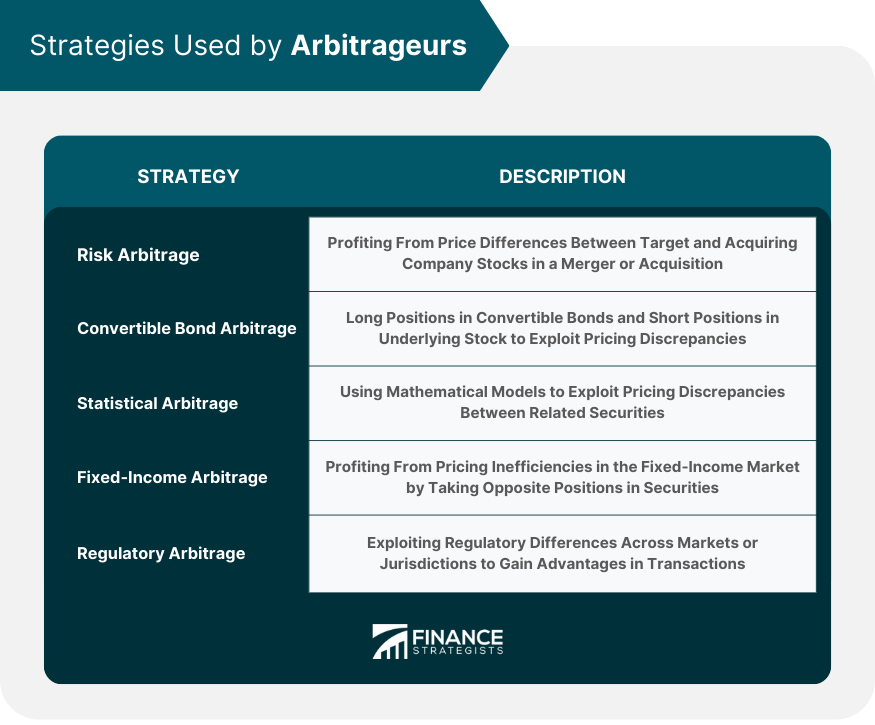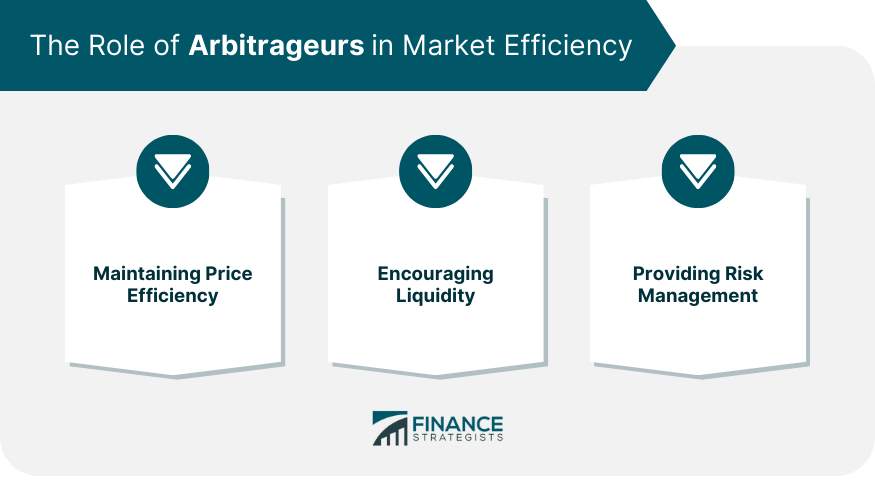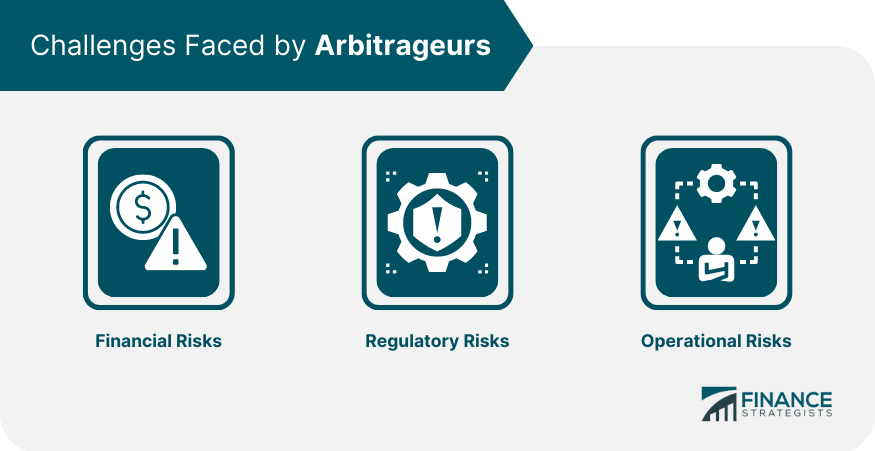An arbitrageur is an individual or entity that engages in arbitrage, the simultaneous purchase and sale of an asset to exploit price differences between markets. Arbitrageurs play a critical role in financial markets by identifying and capitalizing on these price discrepancies, which helps maintain market efficiency, encourages liquidity, and provides risk management opportunities. Arbitrage involves buying an asset in one market at a lower price and simultaneously selling it in another market at a higher price. The arbitrageur captures the difference between the two prices as profit. This process helps equalize prices across markets, as the increased demand in the lower-priced market raises the price, while the increased supply in the higher-priced market lowers the price. Individual investors can engage in arbitrage if they have the necessary knowledge and resources to identify and exploit price discrepancies. However, they may face challenges in competing with more sophisticated market participants, such as institutional investors or hedge funds. Institutional investors, such as mutual funds, pension funds, and investment banks, can act as arbitrageurs due to their access to significant capital and advanced technology. These investors often have specialized teams dedicated to identifying and exploiting arbitrage opportunities. Hedge funds are investment vehicles that use a variety of strategies to generate returns, with some hedge funds specializing in arbitrage. These funds typically have access to large amounts of capital, sophisticated technology, and experienced professionals, which can give them an edge in identifying and capitalizing on arbitrage opportunities. Risk arbitrage, also known as merger arbitrage, involves profiting from the price differences between the target company's stock and the acquiring company's offer price in a merger or acquisition. Arbitrageurs buy shares of the target company and short the shares of the acquiring company, capturing the spread between the two prices. Convertible bond arbitrage involves taking long positions in convertible bonds (debt securities that can be converted into a predetermined number of shares of the issuer's stock) and short positions in the underlying stock. This strategy seeks to profit from pricing discrepancies between the convertible bond and its underlying stock. Statistical arbitrage is a quantitative trading strategy that uses mathematical models to identify and exploit pricing discrepancies between related securities. This strategy typically involves a high volume of trades and requires advanced technology, such as algorithmic trading systems, to execute efficiently. Fixed-income arbitrage is a strategy that seeks to profit from pricing inefficiencies in the fixed-income market, such as government bonds, corporate bonds, or other interest-bearing securities. This strategy often involves taking opposite positions in different fixed income securities with similar risk profiles, capturing the spread between them. Regulatory arbitrage involves exploiting differences in regulatory treatment across different markets or jurisdictions. Arbitrageurs can profit by structuring transactions in a way that takes advantage of these regulatory discrepancies, such as tax laws, accounting standards, or financial regulations. By capitalizing on price discrepancies, arbitrageurs help ensure that prices reflect all available information and are consistent across different markets. This activity helps maintain price efficiency, an essential characteristic of well-functioning financial markets. Arbitrage activity can increase market liquidity by adding to the volume of transactions. Increased liquidity can reduce transaction costs, improve price discovery, and make markets more resilient to shocks. Arbitrage strategies often involve taking offsetting positions in different securities or markets, which can provide a form of risk management. For example, an arbitrageur might hedge a long position in one market with a short position in another, reducing the overall risk of the strategy. Despite the perception of arbitrage as a risk-free strategy, arbitrageurs can face significant financial risks. These can include market risk, liquidity risk, and counterparty risk, among others. For example, an expected price convergence might not occur, or a counterparty might default on a transaction. Arbitrageurs must navigate a complex landscape of financial regulations, which can vary across different markets and jurisdictions. Changes in regulatory policies or enforcement can pose significant risks to arbitrage strategies. Arbitrageurs can also face operational risks related to technology, personnel, or processes. For example, a failure in a trading system could prevent the execution of an arbitrage strategy, or an error in a pricing model could lead to losses. Technological advancements have significantly impacted arbitrage activities. Algorithmic trading and high-frequency trading (HFT) have become increasingly prevalent, enabling arbitrageurs to identify and exploit price discrepancies more quickly and efficiently than ever before. Automation has allowed for the streamlining of many arbitrage strategies, reducing the need for manual intervention and improving speed and efficiency. This has made it possible for arbitrageurs to exploit even small and short-lived arbitrage opportunities that would not have been feasible in the past. While technology has brought many benefits to arbitrageurs, it has also introduced new risks. These can include technological failures, cybersecurity threats, or the risk of overreliance on complex quantitative models that may not perform as expected in all market conditions. An arbitrageur is a participant in financial markets who takes advantage of price discrepancies across different markets or assets to generate risk-free profit. By doing so, they play a crucial role in maintaining market efficiency and encouraging market liquidity. Arbitrageurs exploit price discrepancies across different markets or assets, capitalizing on these differences to generate risk-free profit. This process helps equalize prices across markets and ensures market efficiency. While the potential for profit is significant, arbitrage activities carry notable risks, including financial, regulatory, and operational risks. Technological advancements have both facilitated and complicated arbitrage activities, enabling faster and more efficient strategies while introducing new risks. Arbitrage, while potentially profitable, involves complex strategies and significant risks. Therefore, it's crucial for individuals considering engaging in such activities to seek professional advice. Financial advisors or investment professionals can provide valuable insights and guidance to help navigate the intricacies of arbitrage and mitigate potential risks.What Is an Arbitrageur?
The Concept of Arbitrage
Who Can Be an Arbitrageur?
Individual Investors
Institutional Investors
Hedge Funds
Strategies Used by Arbitrageurs
Risk Arbitrage
Convertible Bond Arbitrage
Statistical Arbitrage
Fixed-Income Arbitrage
Regulatory Arbitrage

The Role of Arbitrageurs in Market Efficiency
Maintaining Price Efficiency
Encouraging Liquidity
Providing Risk Management

Risks and Challenges Faced by Arbitrageurs
Financial Risks
Regulatory Risks
Operational Risks

The Impact of Technology on Arbitrageur Activities
Algorithmic Trading and High-Frequency Trading
Automation and Its Advantages
Technology-Induced Risks
Final Thoughts
Arbitrageur FAQs
An arbitrageur is an individual or entity that engages in arbitrage, which involves taking advantage of price discrepancies in different markets to make a profit with little or no risk.
Arbitrageurs make money by exploiting price differences in various markets. They buy an asset at a lower price in one market and sell it at a higher price in another market, profiting from the price discrepancy.
Arbitrageurs need a strong understanding of different markets, financial instruments, and pricing mechanisms. They must possess analytical skills, quick decision-making abilities, and knowledge of trading strategies to identify and exploit profitable arbitrage opportunities.
While arbitrage is generally considered a low-risk strategy, there are still risks involved. These risks include execution risk (delays in executing trades), market risk (price movements that reduce potential profits), and regulatory risks (changes in laws or regulations affecting arbitrage activities).
While anyone can technically become an arbitrageur, it requires a certain level of expertise, financial resources, and access to multiple markets. Successful arbitrageurs often have a background in finance or trading and a deep understanding of the markets they operate in.
True Tamplin is a published author, public speaker, CEO of UpDigital, and founder of Finance Strategists.
True is a Certified Educator in Personal Finance (CEPF®), author of The Handy Financial Ratios Guide, a member of the Society for Advancing Business Editing and Writing, contributes to his financial education site, Finance Strategists, and has spoken to various financial communities such as the CFA Institute, as well as university students like his Alma mater, Biola University, where he received a bachelor of science in business and data analytics.
To learn more about True, visit his personal website or view his author profiles on Amazon, Nasdaq and Forbes.















